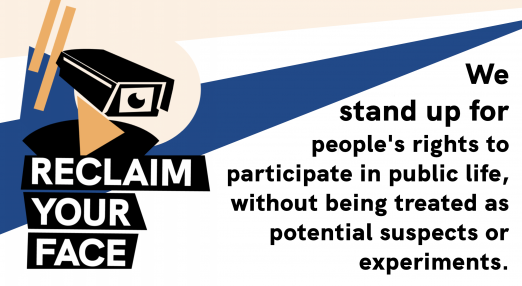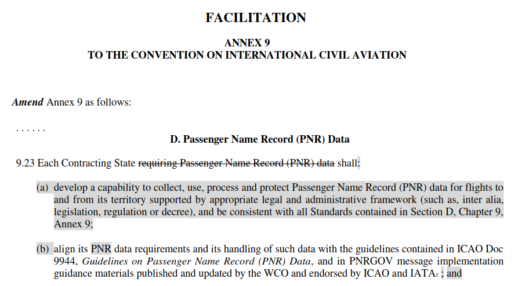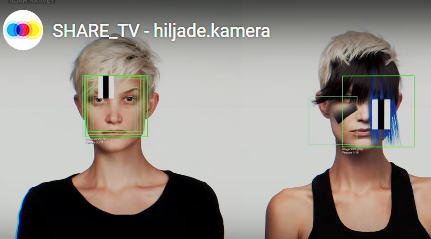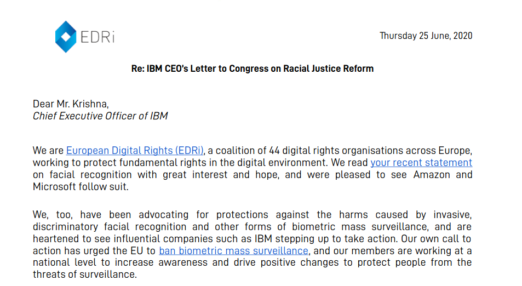surveillance
Filter by...
-

Looking back at digital rights in the era of a surveillance pandemic
2020 started as a year to build momentum to tackle various digital rights issues, including mass surveillance and freedom of expression online. Needless to say, the global pandemic disrupted not only these efforts but also our health, personal relations, basic survival needs and ways to organise around human rights. After 9 months of living and working in a pandemic, we look back at what we achieved and the ways forward from here.
Read more
-

Campaign “Reclaim Your Face” calls for a Ban on Biometric Mass Surveillance
Civil society across Europe launches the “Reclaim Your Face” campaign, demanding that local and national authorities listen to their communities about the serious risks of using facial recognition and other biometric technologies in public spaces. The newly formed coalition calls to ban biometric mass surveillance, in reaction to the rapid and secretive roll out of invasive and unlawful technologies by police forces and local authorities in many European countries.
Read more
-

ICAO mandates worldwide government surveillance of air travelers
Playing out the endgame we predicted last year of a two-decade campaign by the US government to establish a global regime of government surveillance of air travelers, the International Civil Aviation Organization (ICAO) has adopted an amendment to the Chicago Convention on Civil Aviation that will require each of the 193 state parties to that treaty — essentially every national government in the world — to require all airlines operating international flights to provide a designated government agency with complete mirror copies of all reservation records (“Passenger Name Records“) in a standard PNRGOV transmission format.
Read more
-

SHARE Foundation presents #hiljadekamera : A documentary on biometric mass surveillance
SHARE Foundation has recently released a short documentary on the controversial use of the mass surveillance system in Belgrade, Serbia. Various digital experts and activists took part in the documentary, including the national Data Protection Authority in Serbia and EDRi's own Policy and Campaigns Officer, Ella Jakubowska.
Read more
-

Digital rights for all
In this article we set out the background to EDRis’ work on anti-discrimination in the digital age. Here we take the first step to explore anti-discrimination as a digital rights issue, and then, what can EDRi do about it? The project is motivated by the need to recognise how oppression, discrimination and inequality impact the enjoyment of digital rights, and to live up to our commitment to uphold the digital rights of all.
Read more
-

Open Letter: EDRi calls on IBM to clarify stance on facial recognition
On 25 June, EDRi sent an open letter to the CEO of IBM in response to their 8 June statement on racial equality and facial recognition in the US.
Read more
-

COVID-Tech: COVID-19 opens the way for the use of police drones in Greece
In EDRi’s series on COVID-19, COVIDTech, we explore the critical principles for protecting fundamental rights while curtailing the spread of the virus, as outlined in the EDRi network’s statement on the pandemic.
Read more
-

The threat on OTF as a wake up call for European digital sovereignty
Around 2 billion people in 60 countries are able to use the internet securely and without risks of being surveilled or censored. And all of this, thanks to the work done by a non-profit called Open Tech Fund (OTF) for only 15 million dollars a year. However, all of this may be over soon.
Read more
-

COVID-Tech: Surveillance is a pre-existing condition
In EDRi’s series on COVID-19, COVIDTech, we will explore the critical principles for protecting fundamental rights while curtailing the spread of the virus, as outlined in the EDRi network’s statement on the virus.
Read more
-

German Constitutional Court stops mass surveillance abroad
The German Federal Intelligence Service (BND) has so far been able to spy on foreign citizens abroad en masse and without cause—even on sensitive groups such as journalists.
Read more
-

France: First victory against police drones
Since the beginning of the COVID-19 crisis, French police has been using drones to watch people and make sure they respect the lockdown. Drones had been used before by the police for the surveillance of protests, but the COVID-19 crisis represented a change of scale.
Read more
-

Hungary: “Opinion police” regulate Facebook commentaries
There have been a number of critical news reports from around the world stating that Hungary’s COVID-19 state-of-emergency legislation is “creating a chilling effect”. Such headlines miss the mark somewhat, as chilling effects are far from new.
Read more
